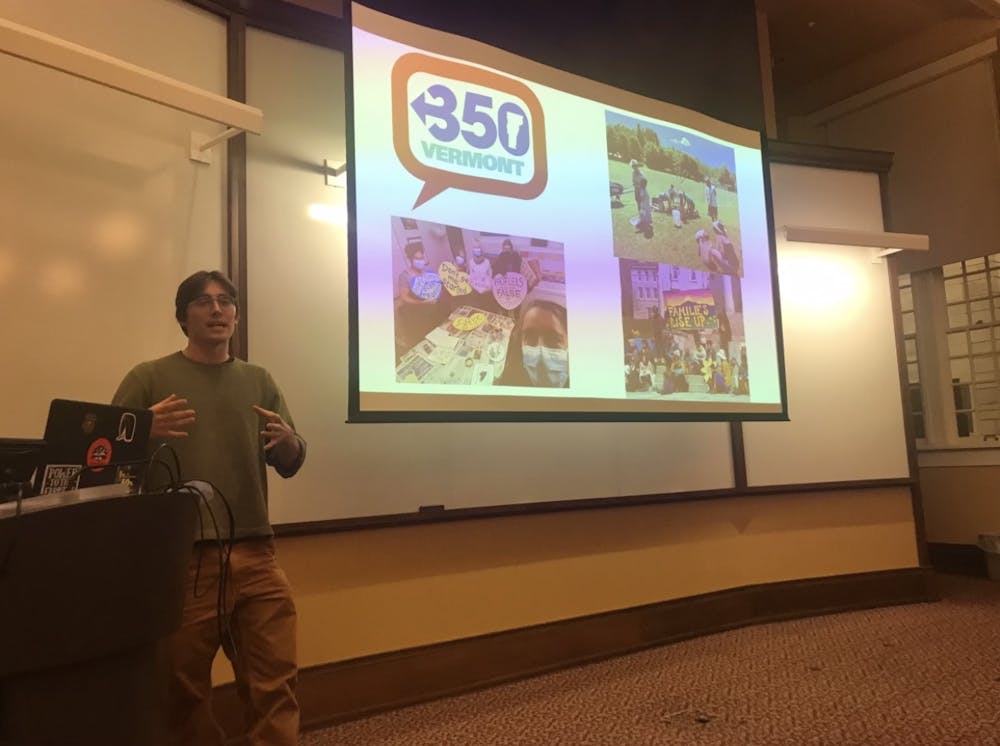Members of Middlebury’s Sunday Night Environmental Group (SNEG) held an Empower Vermont event in conjunction with 350Vermont, a climate justice non-profit organization based in Burlington, Vt., on Tuesday, Dec. 5 in Axinn 229.
350Vermont, founded by Schumann Distinguished Scholar of Environmental Studies Bill McKibben and a group of Middlebury students in 2007, was the first global grassroots climate campaign. The organization works toward climate solutions by running campaigns and workshops throughout the state, according to its website.
The event began with a presentation from Connor Wertz ’22, a community organizer at 350Vermont. Speaking for about thirty minutes to around 50 students, Wertz described Vermont’s progress in climate justice and environmental advocacy — what he called the “climate landscape” — and its shortcomings.
He said that the state's efforts towards climate justice are not as strong or pervasive as is commonly thought. According to Wertz, Vermont’s state legislature is lagging behind those of nearby states like New York, New Hampshire and Massachusetts in the climate action needed to address the crisis.
SNEG Co-Manager Charlotte Roberts ’25.5 commended the turnout at the event and emphasized the importance of SNEG’s work on campus.
“I’m happy that we are finally at the point where we can host events on campus like this and get 45 or so people to come, and rally the campus to go to an event in Montpelier,” she said.
In his presentation, Wertz described how Vermont is the worst among its neighbors in implementing renewable energy sources, and is guilty of engaging in “greenwashing,” which he characterized as performative, symbolic gestures by which energy companies claim to be climate-friendly in order to mask noncompliance with environmental guidelines and legislation.
He noted that 350Vermont’s organization of community-driven, grassroots climate activism is part of a general move toward greater urgency when it comes to addressing climate change.
The current balance of decision-making power around climate action is skewed too heavily towards the side of corporate interests, Wertz said in his presentation. This leaves little room, he explained, for citizens to have a say in what climate policies are introduced, considered or rejected by legislators.
Wertz said 350Vermont’s goal is to form a coalition of students, community members, activists and experts strong enough to reverse the current power dynamic and give the power of shaping the climate narrative to the people for whom it is most important.
The group hopes to see the Vermont legislature adopt a modified Renewable Energy Standard. It is advocating for a prohibition on new large hydropower systems, an end to the “unbundled” Renewable Energy Credit system, a prioritization of in-state low-emissions renewables, a focus on new sources of energy and putting a stop to the exportation of negative impacts of dirty energy production to neighboring states.
Wertz explained that college students around the state and across the nation alike have an important activist network at their disposal. It is key for the climate mission at large to have an organization made up of young, motivated people, he added.
Following the presentation and a brief opportunity for questions, Wertz sectioned the event’s attendees off into small groups and encouraged participants to brainstorm what they would like to see at the Jan. 27 climate rally in Montpelier, Vt., which will call for the Vermont state legislature to change its Renewable Energy Standard.
In the breakout sessions, students considered what would constitute a student-led visual and rhetorical presence at the Jan. 27 rally that would have the most impact.
Wertz led the group through the making of a “power map” — a brainstorming practice commonly used by 35oVermont and other activist groups to determine how to have the biggest impact on specific companies, corporations or decision-making bodies.
For any given target, the power map is split into three categories of consideration: from which sources the target corporation or organization gets its influence and power, what bonds and relationships that corporation or organization hopes to maintain for its own interests and what can be leveraged against them to exert pressure. The Middlebury group generated a detailed power map for Vermont Gas Systems (VGS), a South Burlington, Vt.–based gas company.
In addition to its participation in statewide climate activism, Roberts said that another major project SNEG took on last semester – convincing the college to find alternatives to its contracts with Chase Bank due to the bank’s investments in the fossil fuel industry – continues to be a priority. “That is something that is still actively ongoing between SNEG and the administration,” she added.

Cole Chaudhari '26 (he/him) is the Senior News Editor.
Cole has previously served as a Managing Editor, News Editor, Copy Editor, and Staff Writer. He is majoring in History and English Literature, and spends his time outside of the newsroom reading about sound reproduction technologies and making field recordings. This past summer, he taught high schoolers at a summer program at a boarding school in New Hampshire.




